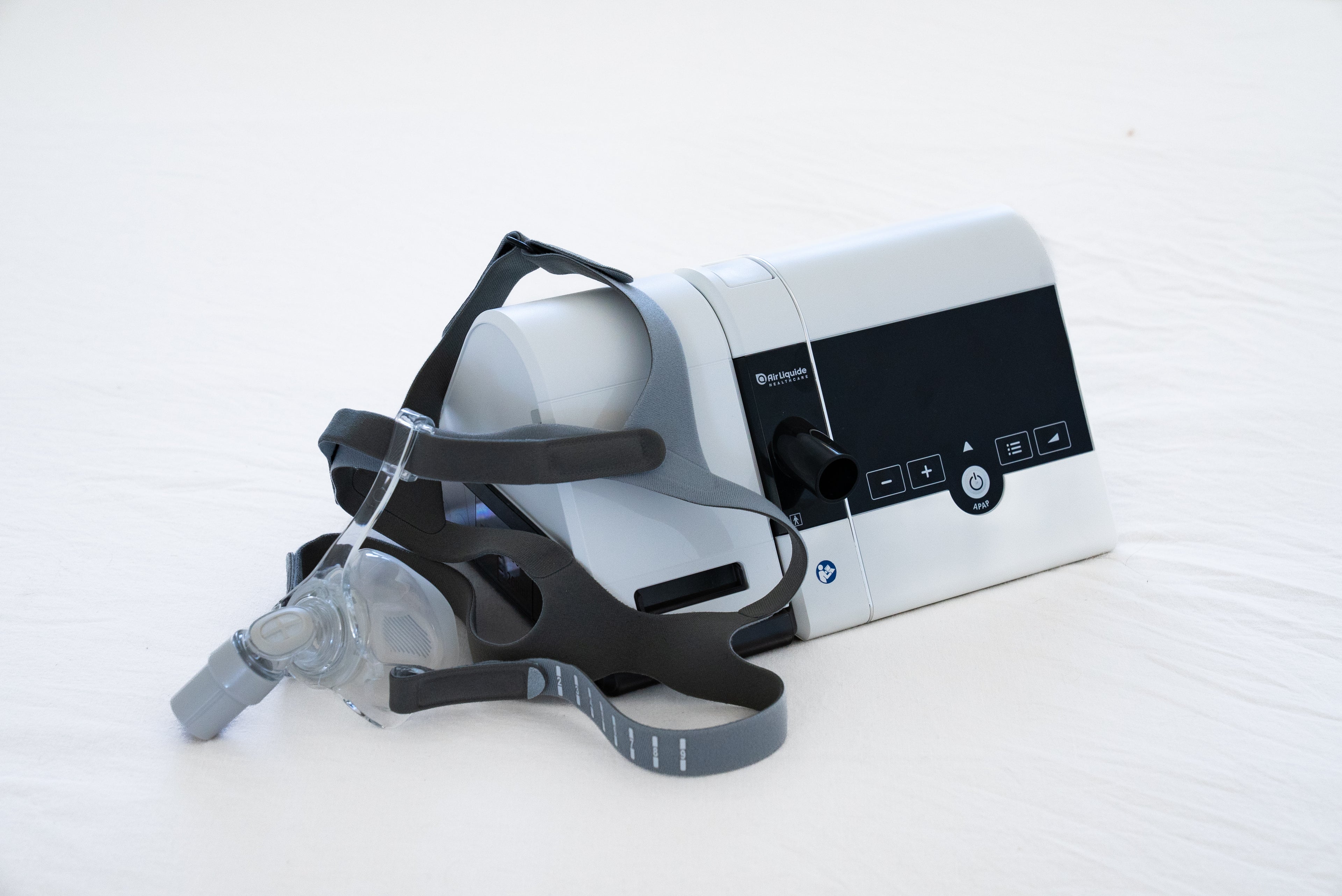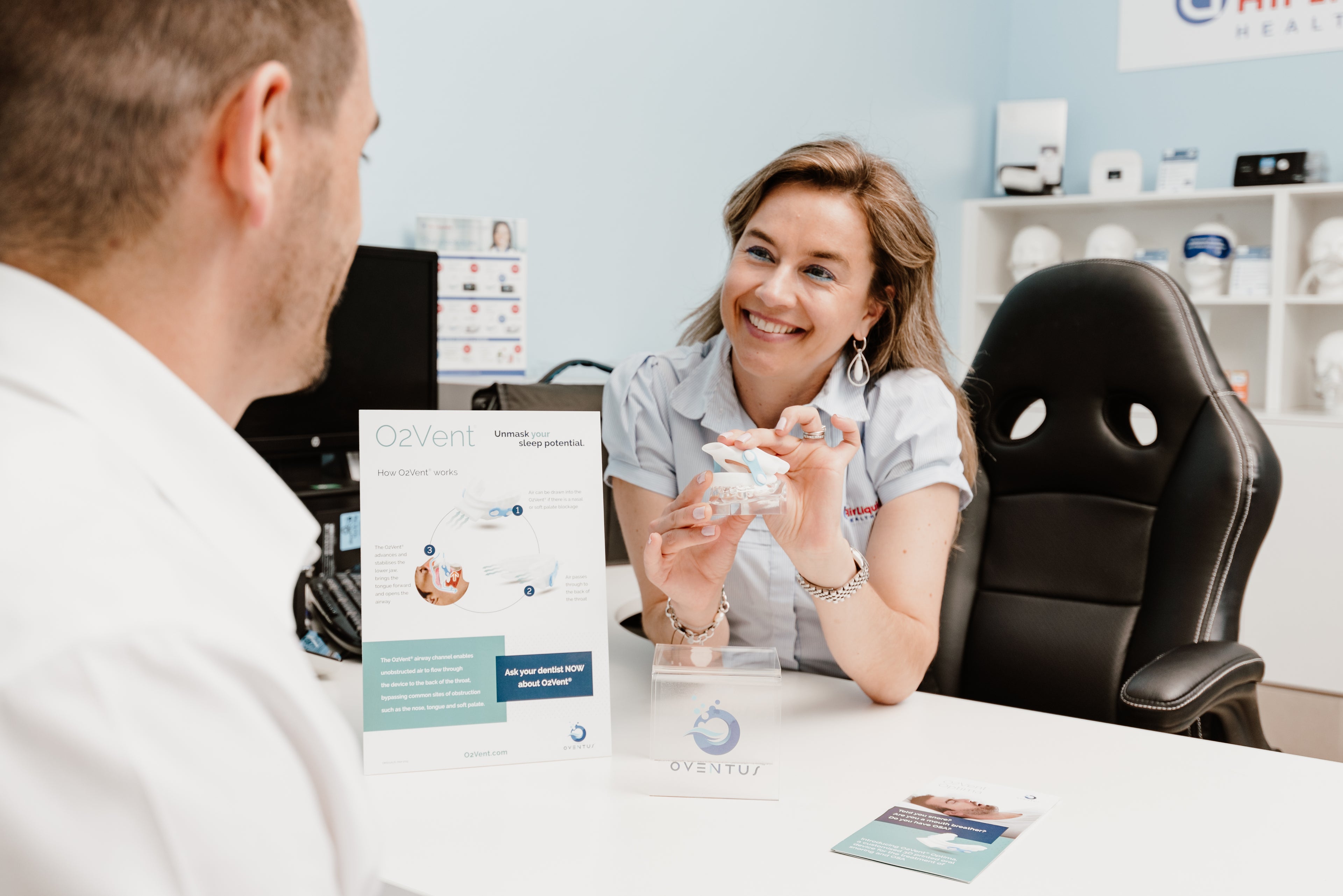Sleep Apnea
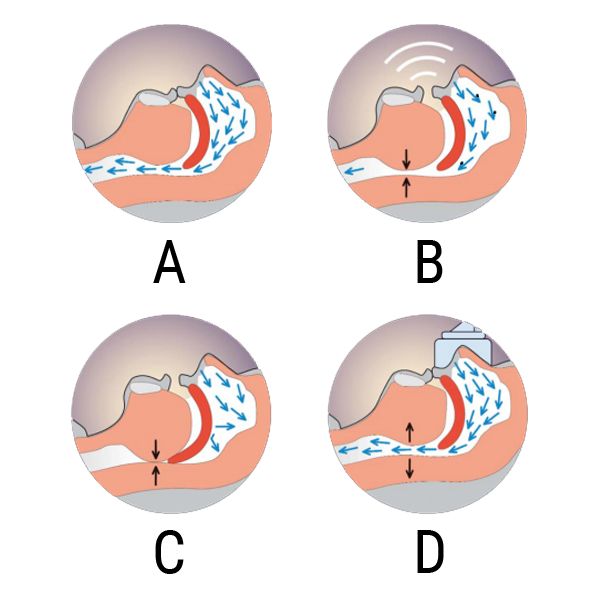
What is Obstructive Sleep Apnea?
Obstructive Sleep Apnea (OSA) is a breathing problem that occurs when we sleep. The upper airway keeps blocking, partially or totally, because the tongue and upper muscles in the throat relax, causing an obstruction in breathing (apnea) lasting over 10 seconds. This obstruction or pause in breathing occurs repeatedly throughout the night. The pauses are followed by gasping, snoring and/or restlessness.
This diagram is a helpful visualisation of what typically occurs for someone experiencing OSA. During normal sleep (A) , the muscles that control your tongue and soft palate hold the airway open. If these muscles relax, your airway will become narrower (B) and the soft or floppy part of the throat vibrates; the noise of snoring results. If your throat is already narrow, or the muscles relax too much, your airway can become completely blocked (C), which prevents breathing. This can be mitigated through the use of a Continuous positive airway pressure (CPAP) machine (D).
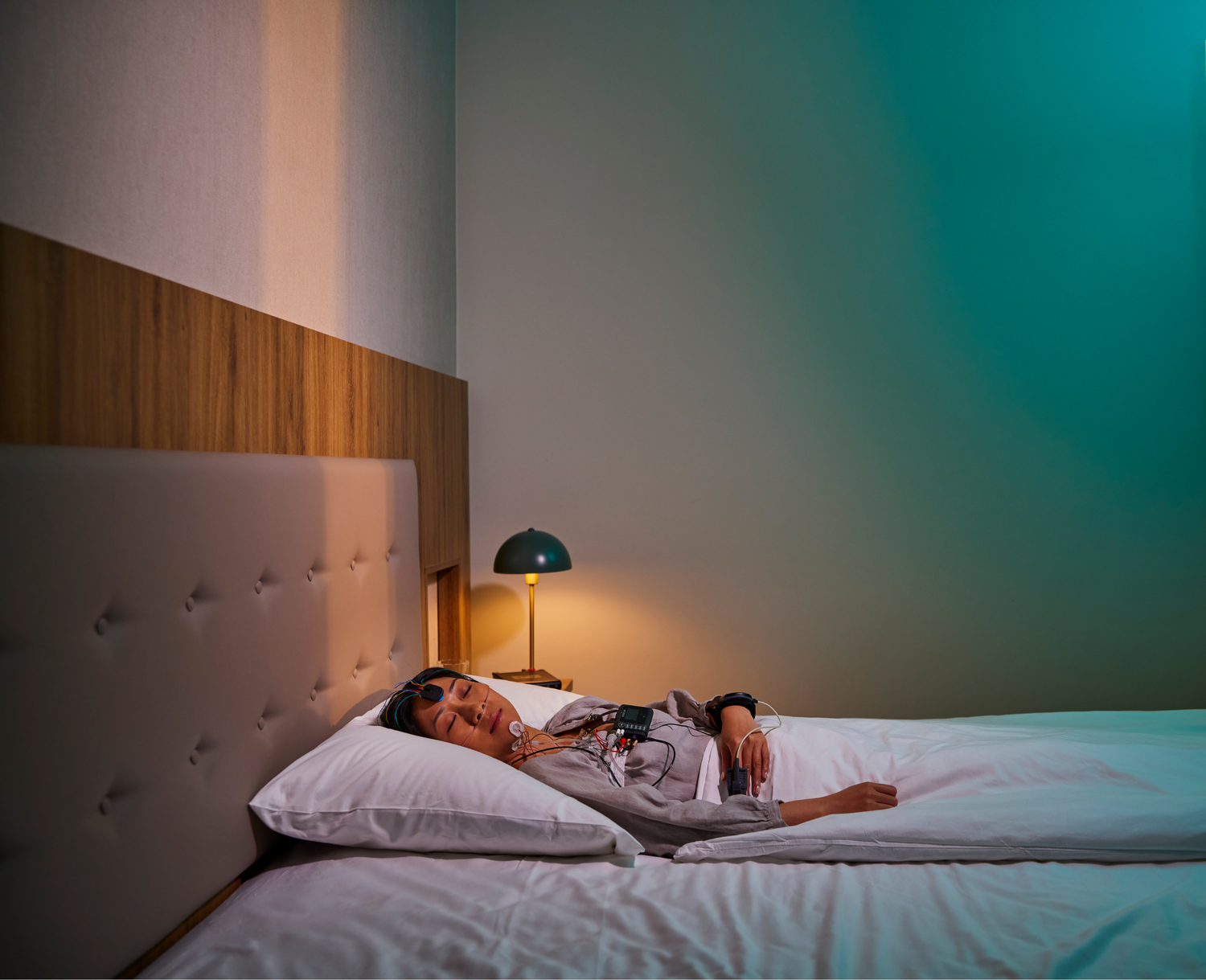
What is a home-based Sleep Study?
A home-based sleep study is a non-invasive recording of your sleep for the diagnosis and evaluation of a sleep disorder. It is performed overnight, while you sleep at home.

Why do I need a Sleep Study?
You may need a sleep study if your doctor has assessed your symptoms, medical history and conditions and has considered it necessary that an investigation for Obstructive Sleep Apnea (OSA) be performed.
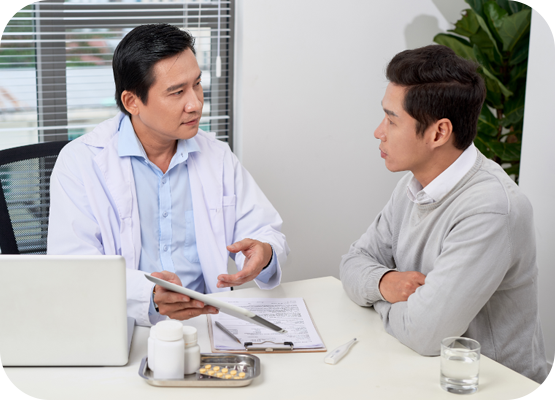
When do I get my results?
Your test will be reviewed by a qualified Sleep Physician within a few weeks. If you have OSA, you will proceed to a therapy initiation and titration program. This will determine the ideal pressure for your therapy and find the best mask for your optimum comfort.
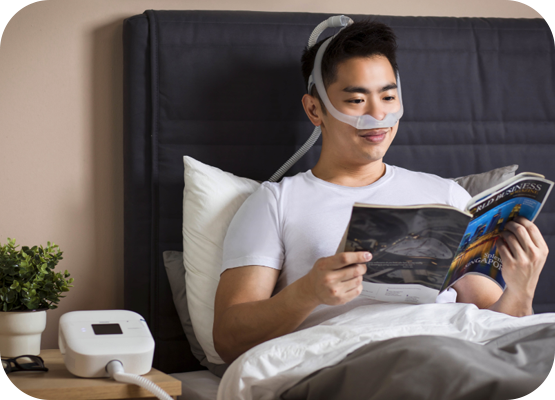
What is CPAP Therapy?
The most effective and widely accepted treatment for sleep apnea is Continuous Positive Airway Pressure (CPAP) therapy. CPAP has proven to be the most effective treatment for moderate to severe Obstructive Sleep Apnea. A CPAP system consists of a small, quiet air pump, and a mask that fits over your nose, or nose and mouth, during your sleep. The pressure from the air-pump forces just enough air through the upper airway to prevent the airway from collapsing during sleep. CPAP therapy does not involve drugs or surgery.
Our CPAP therapy program
We will guide you in selecting the most appropriate CPAP machine, mask and level of humidification to suit your personal needs.
Health benefits information
Medicare covers the diagnostic test if you satisfy criteria defined in the Medicare Benefits Schedule (MBS) guidelines for sleep studies. Your GP will advise you about this when completing the referral. Most private health insurers include CPAP therapy under certain packages. We recommend contacting your health insurance provider to check your level of cover.
Accessible Sleep Apnea treatment options in Australia
Sleep apnea can cause a lot of discomfort for people that have it. Whether you have mild or severe sleep apnea, you can expect a range of symptoms and effects. From interrupting a good night's sleep to disturbing your bed partner, sleep apnea can present a a huge hassle to your daily life.
That's why Air Liquide Healthcare offers the best sleep apnea treatments in Australia. When you order a continuous positive airway pressure (CPAP) machine from us, use any of the alternative sleep apnea treatments on our website, or a schedule a consultation with a sleep specialist, you can expect a top-tier experience.
What is Sleep Apnea?
Sleep apnea is a common dyssomnia (a condition that prevents people from sleeping) caused by the pharyngeal muscles relaxing during deep sleep. This collapses the airway of people with sleep apnea, which gets in the way of their sleep.
Those with sleep apnea, whether it's mild sleep apnea or severe obstructive sleep apnea, deal with symptoms such as snoring, insomnia, and more. On top of that, sleep apnea can cause people to stop breathing in their sleep, forcing them awake and keeping them away from much-needed rest.
This is a major condition that can greatly affects your sleep quality, creating a dire need for sleep apnea solutions in Australia. There are many Australians that suffer from sleep apnea without even knowing it.
Sleep apnea is one of the most common sleep disorders among Australians, which is why many people are looking to treat sleep apnea through the use of different machines and therapy.
How many Australians have Sleep Apnea?
While sleep apnea is fairly common, it often goes undiagnosed. In fact, recent studies project that over 80% of people with sleep apnea are undiagnosed. As at 2024, over 5% of Australians suffer from sleep apnea. Obese individuals and men over the age of 30, are at a significantly increased risk of sleep apnea.
Although sleep apnea is a common sleep disorder, it's important to get diagnosed by a specialist to understand the best way to treat the condition for your individual needs. If you suspect that you have sleep apnea and can't keep your airway open in your sleep, we strongly recommend visiting a doctor so that they can properly diagnose you.
And when you have recommended treatment options available, head to our website. We feature the best treatment options for uncontrolled sleep apnea, obstructive sleep apnea, and central sleep apnea.
Types of Sleep Apnea
To fully understand the effects of sleep apnea, it's good to look at the types of sleep apnea people experience. The type of sleep apnea you have can drastically impact what you feel and the best ways to treat the condition. So, here are the different types of sleep apnea and what makes them unique.
Complex Sleep Apnea Syndrome
Some sleep specialists call this treatment-emergent central sleep apnea. This type of sleep apnea is a combination of central and obstructive sleep apnea. This is a unique type of sleep apnea, and only a few people have it. However, treatment for this type of disorder can be complicated, and those suffering from it may have difficulty falling asleep.
Common Sleep Apnea Symptoms
One of the reasons diagnosing sleep apnea and treating it in Australia is difficult is that most people won't notice the symptoms right away. In most cases, the person's partner in bed notices and tells them about the symptoms. This is because those with sleep apnea experience symptoms while in a deep sleep, and sometimes, they may not wake up right away, so it's usually the person sleeping with them that notices the condition.
The most common symptoms for obstructive sleep apnea include the following:
- Excessive snoring
- Fatigue and daytime sleepiness
- Dry mouth or sore throat muscles when you wake up
- Headaches
- Sexual dysfunction
- Trouble concentrating
- Forgetfulness
- Restlessness
- Regular nightmares
- Excessive need to pee at night
- Night sweats
- Depression and anxiety
If you notice these symptoms in your bed partner, it's a good sign to see a specialist to determine if they have sleep apnea. That way, they can apply the right sleep medicine and treatments for the condition.
For central sleep apnea, the symptoms are slightly different. Most people who suffer from the condition frequently wake up at night or experience insomnia. Oftentimes, they gasp for air at night when they try to wake up.
Other common symptoms of central sleep apnea include:
- Sleepiness
- Poor school and work performance
- Trouble swallowing
- Bedwetting (usually in children)
- Odd sleeping positions
- Daytime mouth breathing
The symptoms of central sleep apnea are harder to catch in children. This is why if you have a child, it's important to pay close attention to how they sleep so you can bring them to the right professionals if you suspect that something with their central nervous system is causing sleep apnea.
What Causes Sleep Apnea?
The main cause of sleep apnea is the muscles in your throat collapsing and blocking your airways. Sleep apnea can affect anyone, and most people with the condition don't even know about their sleep-disordered breathing. Since everyone can get sleep apnea, it's hard to determine the exact causes of the condition.
However, research has shown that some of the most risk factors that increase the chances of developing sleep apnea include:
- Being overweight
- Narrow airways that you inherited from your family
- Smoking
- Family history of sleep apnea
- Older age
- Being male
- Alcohol and drug use
- Nasal congestion
- Large necks and narrower airways
- Certain medical conditions include Parkinson's, ALS, congestive heart failure, POS, hormonal disorders, and even high blood pressure
Since there are many risk factors to consider with sleep apnea, it's important to see a sleep specialist to determine whether or not you have the condition. Additionally, it might be beneficial to reduce the risk by taking control of certain risk factors to prevent sleep apnea. For example, losing weight, having a healthy diet, and reducing alcohol and drug use can reduce your chances of developing sleep apnea.
How Do Doctors Diagnose Sleep Apnea?
When diagnosing sleep apnea, speaking to or seeing a sleep specialist is highly recommended. When you see a doctor or sleep specialist to ask about sleep apnea, they will first try to rule out any other causes by talking to you about different reasons you might be experiencing this. This is why most doctors will ask you about your family history, drug use, and other medical conditions to ensure that sleep apnea causes your symptoms.
If the specialist determines that you may have sleep apnea, they will dive into the possible causes of the condition. This is why the consultation includes a deep dive into your medical history. On top of that, your doctor will likely conduct a physical examination and might even refer you to a specialist to perform sleep studies on you.
After the consultation, the doctor uses the test results to determine the severity of your sleep apnea. Typically, this involves looking at the number of episodes you have in an hour of sleep.
Additionally, you should be ready for other tests when you go to a doctor to help treat your sleep apnea. This is because doctors must look at all the possibilities to find the best sleep apnea solutions for your needs. So, expect blood tests, hormone tests, and other sleep study examinations to help the doctor determine the exact causes of your sleep apnea and explore ways to treat it.
What can make Sleep Apnea Worse?
One of the main things to remember when you suffer from this condition is that there is no cure unless you go in for neck surgery, nasal surgery, or upper airway surgery to fully get rid of the condition.
However, most people with sleep apnea need to look at different treatment options to lessen and manage their condition. This is why treatment can be very complicated, and the exact methodology varies depending on the condition.
When you suffer from sleep apnea, it's important that you make sure to avoid things that can worsen your condition. For example, excess weight, alcohol and drug use, and even certain sleep medicine can worsen your condition. So, pay close attention to these factors to keep your condition down to a minimum.
Finding the Best Sleep Apnea Treatment Options
Finding a proper sleep apnoea treatment is hard. Aside from the many causes of sleep apnoea, various types of the disorder affect how you treat the condition. This is why it's crucial for you to see a specialist or doctor to talk about the best treatment option for your needs.
And once you have the recommendations and made your choice, head on over to our website to find the best prices and deals for top-quality sleep apnoea treatments. We have some of the best services in Australia, so don't hesitate to visit our page.






